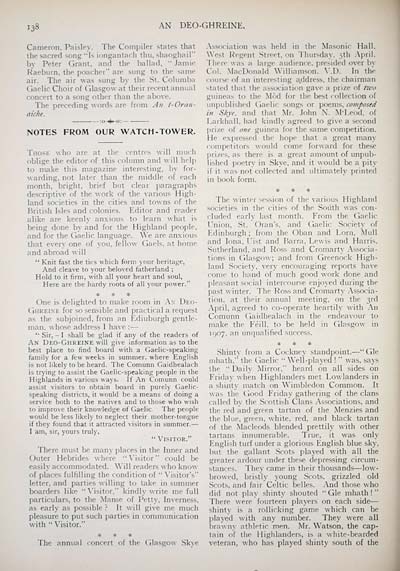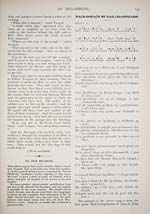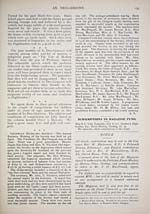Blair Collection > Deo-gréine
(162)
Download files
Complete book:
Individual page:
Thumbnail gallery: Grid view | List view

138
AN DEO-GHREINE.
Cameron, Paisley. The Compiler states that
the sacred song"Is iongantach thu, shaoghail"
by Peter Grant, and the ballad, " Jamie
Raeburn. the poacher" arc sung to the same
air. The air was sung by the Si. Columba
( iaelic Choir of Glasgow at their recent annual
concert to a song other than the above.
The preceding words are from A» t-Oran-
aiche.
NOTES FROM OUR WATCH-TOWER.
who arc at the centres w ill much
oblige the editor of this column and will help
to make this magazine interesting, by for-
warding, not later than the middle of cadi
month, bright, brief but clear paragraphs
descriptive of the work of the various High-
land societies in the cities and towns of the
British Isles and colonics. Editor and reader
alike are keenly anxious to learn what is
being done by and for the Highland people,
and for the Gar-lie language. We are anxious
that every one of you, fellow Gaels, at home
and abroad will
" Knit fast the tics which form your heritage,
And cleave to your beloved fatherland ;
Hold to it firm, with all your heart and soul,
Here are the hardy roots of all your power.''
* * *
( >nc is delighted to make room in Ax Deo-
Ghreine for so sensible and practical a request
as the subjoined, from an Edinburgh gentle-
man, whose address 1 have : —
'• Sir, - I shall be glad if any of the readers of
An Deo-Ghreine will give information as to the
best place to find board with a Gaelic-speaking
family for a few weeks in summer, where English
is not likely to be heard. The Comunn Gaidhealach
is trying to assist the Gaelic-speaking people in the
Highlands in various ways. If An Comunn could
assist visitors to obtain board in purely Gaelic-
speaking districts, it would be a means of doing a
service both to the natives and to those who wish
to improve their knowledge of Gaelic The people
would be less likely to neglect their mother-tongue
if they found that it attracted visitors in summer. —
I am, sir, yours truly,
'• Visitor."
1 h< i' must be man) places in the Inner and
Outer Hebrides where "Visitor" could be
easily accommodated. Will readers who know
of places fulfilling the condition of " Visitor's"
letter, and parties willing to take in summer
boarders like "Visitor," kindly write me full
particulars, to the Manse of Petty, Inverness,
as early as possible ? It will give me much
pleasure to put such parties in communication
with "Visitor."
* * *
The annual concerl of the Glasgow Skye
Association was held in tin 1 Masonic Hall,
Wes1 Regent Street, on Thursday. 5th April.
'I here wax a large audience, presided over bv
CI. MacDonald Williamson, V.D. In the
course of an interesting address, the chairman
stated that the association gave a prize of two
guineas to the Mod lor the best collection of
unpublished (iaelic songs or poems, composed
in Skye, and that Mr. John X. M'Leod, of
Larkhall, had kindly agreed to give a second
prize of one guinea for the same competition.
He expressed the hope that a great many
competitors would come forward for these
prizes, as there is a great amount of unpub-
lished poetry in Skye, and it would be a pity
if it was not collected and ultimately printed
m book- form.
* * *
The winter session of the various Highland
societies in the cities of the South was con-
cluded early last month. Erom the Gaelic
Union, St. Oran's, and Gaelic Societx of
Edinburgh; from the Oban and Lorn, Mull
and lona, 1'ist and Barra, Lewis and Harris,
Sutherland, and Ross and Cromarty Associa-
tions in Glasgow; and from Greenock High-
land Society, very encouraging reports have
come to hand of much good work done and
pleasant social intercourse enjoyed during the
past winter. The Ross and Cromarty Associa-
tion, at their annual meeting, on the 3rd
April, agreed to co-operate heartily with An
Comunn Gaidhealach in the endeavour to
make the Fèill, to be held in Glasgow in
1907, an unqualified success.
* * *
Shinty from a Cockney standpoint. — " Gle
mhath," the (iaelic " Well-played ! " was, says
the "Daily Mirror," heard on all sides on
Friday when Highlanders met Lowlanders in
a shinty match on Wimbledon Common. It
was the Good Friday gathering of the clans
called by the Scottish Clans Associations, and
the red and green tartan of the Menzies and
the blue, green, white, red, and black tartan
of the Macleods blended prettily with other
tartans innumerable. True, it was only
English turf under a glorious English blue sky,
but the gallant Scots played with all the
greater ardour under these depressing circum-
stances. They came in their thousands — low-
browed, bristly young Scots, grizzled old
Scots, and fair Celtic belles. And those who
did not play shinty shouted "Gle mhath!"
There were fourteen players on each side —
shinty is a rollicking game which can be
played with any number. They were all
brawny athletic men. Mr. Watson, the cap-
tain of the Highlanders, is a white-bearded
veteran, who has played shinty south of the
AN DEO-GHREINE.
Cameron, Paisley. The Compiler states that
the sacred song"Is iongantach thu, shaoghail"
by Peter Grant, and the ballad, " Jamie
Raeburn. the poacher" arc sung to the same
air. The air was sung by the Si. Columba
( iaelic Choir of Glasgow at their recent annual
concert to a song other than the above.
The preceding words are from A» t-Oran-
aiche.
NOTES FROM OUR WATCH-TOWER.
who arc at the centres w ill much
oblige the editor of this column and will help
to make this magazine interesting, by for-
warding, not later than the middle of cadi
month, bright, brief but clear paragraphs
descriptive of the work of the various High-
land societies in the cities and towns of the
British Isles and colonics. Editor and reader
alike are keenly anxious to learn what is
being done by and for the Highland people,
and for the Gar-lie language. We are anxious
that every one of you, fellow Gaels, at home
and abroad will
" Knit fast the tics which form your heritage,
And cleave to your beloved fatherland ;
Hold to it firm, with all your heart and soul,
Here are the hardy roots of all your power.''
* * *
( >nc is delighted to make room in Ax Deo-
Ghreine for so sensible and practical a request
as the subjoined, from an Edinburgh gentle-
man, whose address 1 have : —
'• Sir, - I shall be glad if any of the readers of
An Deo-Ghreine will give information as to the
best place to find board with a Gaelic-speaking
family for a few weeks in summer, where English
is not likely to be heard. The Comunn Gaidhealach
is trying to assist the Gaelic-speaking people in the
Highlands in various ways. If An Comunn could
assist visitors to obtain board in purely Gaelic-
speaking districts, it would be a means of doing a
service both to the natives and to those who wish
to improve their knowledge of Gaelic The people
would be less likely to neglect their mother-tongue
if they found that it attracted visitors in summer. —
I am, sir, yours truly,
'• Visitor."
1 h< i' must be man) places in the Inner and
Outer Hebrides where "Visitor" could be
easily accommodated. Will readers who know
of places fulfilling the condition of " Visitor's"
letter, and parties willing to take in summer
boarders like "Visitor," kindly write me full
particulars, to the Manse of Petty, Inverness,
as early as possible ? It will give me much
pleasure to put such parties in communication
with "Visitor."
* * *
The annual concerl of the Glasgow Skye
Association was held in tin 1 Masonic Hall,
Wes1 Regent Street, on Thursday. 5th April.
'I here wax a large audience, presided over bv
CI. MacDonald Williamson, V.D. In the
course of an interesting address, the chairman
stated that the association gave a prize of two
guineas to the Mod lor the best collection of
unpublished (iaelic songs or poems, composed
in Skye, and that Mr. John X. M'Leod, of
Larkhall, had kindly agreed to give a second
prize of one guinea for the same competition.
He expressed the hope that a great many
competitors would come forward for these
prizes, as there is a great amount of unpub-
lished poetry in Skye, and it would be a pity
if it was not collected and ultimately printed
m book- form.
* * *
The winter session of the various Highland
societies in the cities of the South was con-
cluded early last month. Erom the Gaelic
Union, St. Oran's, and Gaelic Societx of
Edinburgh; from the Oban and Lorn, Mull
and lona, 1'ist and Barra, Lewis and Harris,
Sutherland, and Ross and Cromarty Associa-
tions in Glasgow; and from Greenock High-
land Society, very encouraging reports have
come to hand of much good work done and
pleasant social intercourse enjoyed during the
past winter. The Ross and Cromarty Associa-
tion, at their annual meeting, on the 3rd
April, agreed to co-operate heartily with An
Comunn Gaidhealach in the endeavour to
make the Fèill, to be held in Glasgow in
1907, an unqualified success.
* * *
Shinty from a Cockney standpoint. — " Gle
mhath," the (iaelic " Well-played ! " was, says
the "Daily Mirror," heard on all sides on
Friday when Highlanders met Lowlanders in
a shinty match on Wimbledon Common. It
was the Good Friday gathering of the clans
called by the Scottish Clans Associations, and
the red and green tartan of the Menzies and
the blue, green, white, red, and black tartan
of the Macleods blended prettily with other
tartans innumerable. True, it was only
English turf under a glorious English blue sky,
but the gallant Scots played with all the
greater ardour under these depressing circum-
stances. They came in their thousands — low-
browed, bristly young Scots, grizzled old
Scots, and fair Celtic belles. And those who
did not play shinty shouted "Gle mhath!"
There were fourteen players on each side —
shinty is a rollicking game which can be
played with any number. They were all
brawny athletic men. Mr. Watson, the cap-
tain of the Highlanders, is a white-bearded
veteran, who has played shinty south of the
Set display mode to: Large image | Transcription
Images and transcriptions on this page, including medium image downloads, may be used under the Creative Commons Attribution 4.0 International Licence unless otherwise stated. ![]()
| Early Gaelic Book Collections > Blair Collection > Deo-gréine > (162) |
|---|
| Permanent URL | https://digital.nls.uk/76699475 |
|---|
| Description | A selection of books from a collection of more than 500 titles, mostly on religious and literary topics. Also includes some material dealing with other Celtic languages and societies. Collection created towards the end of the 19th century by Lady Evelyn Stewart Murray. |
|---|
| Description | Selected items from five 'Special and Named Printed Collections'. Includes books in Gaelic and other Celtic languages, works about the Gaels, their languages, literature, culture and history. |
|---|

